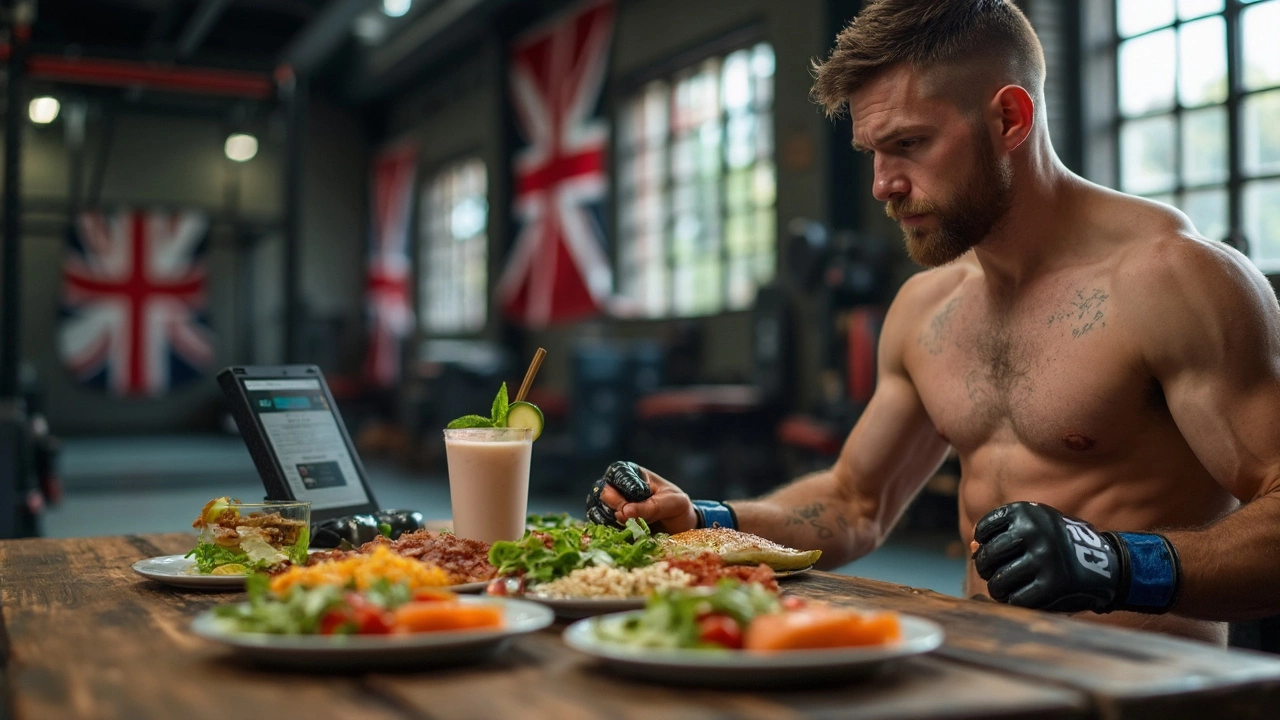MMA Diet Guide: Fuel Your Training and Fight Performance
If you want to hit harder, last longer, and recover faster, the kitchen matters just as much as the gym. A solid MMA diet isn’t about starving yourself or loading up on protein pills – it’s about balancing the right foods at the right times so your body runs like a well‑tuned machine.
Macros and Meal Timing for MMA
Most UK fighters aim for about 45‑55% carbs, 25‑35% protein, and 20‑30% healthy fats. Carbs give you the quick energy for high‑intensity rounds, while protein repairs muscles between sessions. Fat keeps hormones steady and fuels those long sparring nights.
Timing is simple: eat a carb‑rich snack 30‑60 minutes before training (think a banana with a spoon of peanut butter) and follow every workout with a protein‑carb combo within two hours. That post‑workout shake or chicken‑rice bowl tells your body to rebuild, not break down.
Simple Meal Ideas and Supplements
Breakfast could be overnight oats topped with berries and a scoop of whey – easy, portable, and packed with glycogen‑replenishing carbs. Lunch might be grilled salmon, sweet potato, and steamed broccoli; the fish supplies omega‑3s that reduce inflammation, while the sweet potato keeps your glycogen stores full.
Dinner doesn’t need to be fancy either. A stir‑fry with lean beef, mixed peppers, brown rice, and a dash of soy sauce gives you protein, carbs, and micronutrients in one pan. For snacks, keep nuts, Greek yogurt, or a piece of fruit handy – they stop you from grabbing junk when cravings hit.
Supplements can fill gaps, not replace food. Creatine (5g daily) boosts power output, while a daily multivitamin covers any micronutrient shortfalls. If you train fasted, consider a BCAA drink to keep muscle loss low, but most fighters do fine with regular meals.
Hydration is often overlooked. Aim for 3‑4 liters of water a day, plus an extra 500ml around intense sessions. Adding a pinch of sea salt or an electrolyte drink helps maintain electrolyte balance and prevents cramping.
Avoid common pitfalls: overly restrictive carbs, excessive caffeine, and late‑night heavy meals that disrupt sleep. Your body needs steady fuel, not roller‑coaster spikes, to stay sharp for every round.
Finally, track what works for you. A simple food journal or app can reveal patterns – maybe you feel sluggish after dairy or energized after beet juice. Adjust based on how you feel in the cage, not just what a textbook says.
Bottom line: an MMA diet is a flexible framework that supplies steady energy, supports muscle repair, and keeps inflammation low. Stick to whole foods, balance your macros, time your meals around training, and use supplements wisely. With that routine, you’ll notice stronger strikes, quicker recoveries, and more confidence walking into every fight.
- Kaius Farrell
- 0 Comments
Diet Plans of MMA and UFC Athletes: How Fighters Fuel for Glory
MMA and UFC fighters eat like machines—every meal is planned with purpose, aiming for that perfect mix of power, speed, and endurance. This article digs into the real foods fighters swear by, why crash diets can ruin careers, and how lessons from legends can mix with new science. You'll get tips for regular training, dive into weird but true diet stories, and see how fans, fights, and even scandals link back to a fighter’s plate. If you've ever wondered how the pros eat or want a practical guide to MMA nutrition, you're in the right spot.
View More